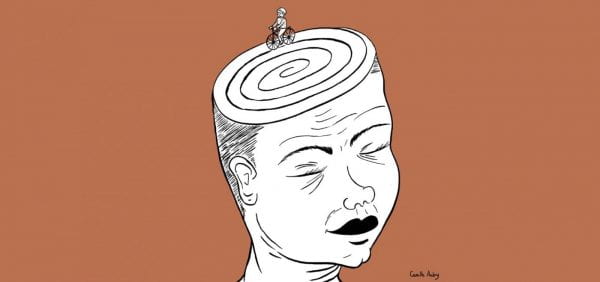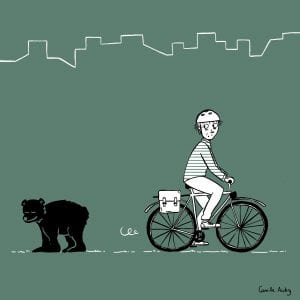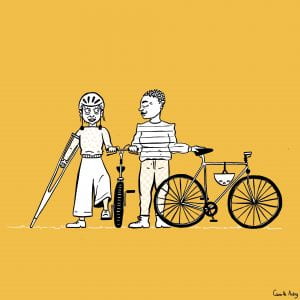
Before Channel 5 aired their broadcast Cyclists: Scourge of the Roads?, described by The Guardian’s Peter Walker as ‘the worst, most scaremongering, inaccurate, downright irresponsible programme on cycling’, I’d already conducted a brief analysis of tabloid coverage of cycling to confirm what I and many other cyclists have felt for a long time: that we get a lot of bad press.
A search of Metro’s online edition between January 2018 and June 2019, for example, shows that non-competitive cycling is associated not only with danger (nearly half of all cycling stories relate to road traffic accidents), but also crimes and misdemeanours committed by cyclists (making up a quarter of cycling-related coverage).
Why, given such negative connotations, does anyone want to cycle? This is one of the questions that Positive Spin sets out to answer. We recently started by working with a group of riders who challenge the cyclist depicted in the anti-cycling press: men and (mostly) women of Life Cycle UK’s over 55 group, the vast majority of whom are past retirement age. This group also defy another set of stereotypes that associate old age with a sedentary lifestyle, ever-declining health and restricted mobility.
On a sunny day in May, we managed to lure them off their bikes to take part in a workshop designed with Lily Green of No Bindings. The aim was to capture their stories and memories of cycling. Through these we hoped to gain a sense of the feelings and emotions these riders, some of whom have returned to cycling only recently, associate with the activity.
Riders experimented with different forms of creative writing and drawing, talking about the things they’d seen and experienced while cycling. These included the everyday (old, forgotten fingerpost signs), nature (from herons to brown bears), and the incongruous (naked ramblers).
They were also asked to talk about an object that they’d brought along and that they associated with cycling and we’ve included excerpts from some of the recordings below. The most common theme to emerge from the interviews was community. Several riders spoke of the benefits that a programme of peer-supported rides such as those initiated by Life Cycle offers. These benefits related to both physical and mental well-being, especially that which comes from friendship.
Cycling was associated with specific friends and journeys undertaken together, but also with making new friends and, in at least two cases, meeting future partners. Being able to support others in their return to cycling was also valued by members of the group.
Happy memories of family and, in some cases, of a lifetime spent cycling also emerged in the course of the day, but, in several cases, riders also recalled losses and absences.
Through this sense of community, cycling offered these riders continuity and connection: to riders’ childhood, family, friends, but also places. Returning to cycling was experienced as a way of reconnecting, not only with the past, but with new people. It was also a way of gaining a unique perspective on the city of Bristol and the surrounding area.
The inability to cycle (because of bike theft or injury) was experienced as a form of deprivation; the return to cycling was seen as liberating allowing the rider to explore and roam once more.
The joy of being mobile was clear in one rider’s story of how cycling enabled her to remain active despite a serious condition which would have otherwise condemned her to a sedentary lifestyle.
Cycling was celebrated by several riders as a form of personal as well as physical achievement. Pleasure could be taken in everything from small victories (just being able to return to cycling after a prolonged absence) to endurance rides, but in both cases riders clearly enjoyed feeling that they were pushing the limits of the aging body and discovering that together they could do more than they’d first expected.
These cyclists offer a very different story of older age, but also of cycling. Listening to them reveals a host of feelings and emotions bound up with a sense of community and place. Questions of safety, risk, infrastructure, and equipment are all low on their agenda. They don’t all wear Lycra, but they do love their bikes. For some, cycling has always been a part of their life while others have returned to it through the mentorship and support offered by Life Cycle’s over 55 riding group.
What tentative lessons might be drawn from this? Creating a welcoming community (as opposed to the tribalism many associate with cycling) appears crucial to the recruitment of returning riders. A sense of belonging and of shared achievement is also key to ensuring that returnees become regulars. These stories also tell us that, through regular participation in group rides, riders can push their own physical limits and challenge preconceived ideas about older age. They also indicate that the principal reasons for persisting with cycling (in what the tabloid press portray as a hostile environment) are emotional.
While creating good infrastructure for cycling is part of the solution to the environmental and health challenges facing the UK, we also need to learn lessons from the positive stories those who already cycle can tell us and to find ways to foster these in those who can be tempted back onto their bikes.
Written by Martin Hurcombe
Artwork by Camille Aubry
Creative activities run by Lucy Condon. Interviews conducted and recorded by Lily Green and edited by Eloise Stevens at the Pervasive Media Studios, the Watershed, Bristol.


